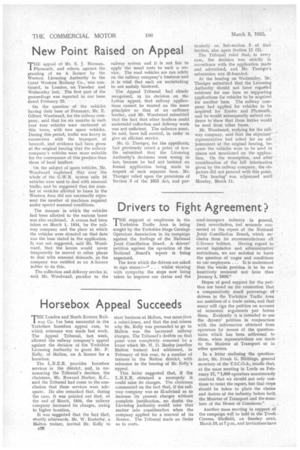New Point Raised on Appeal
Page 48

If you've noticed an error in this article please click here to report it so we can fix it.
THE appeal of Mr. S. J. Norman, Plymouth, and others, against the granting of an A licence by the
Western Licensing Authority to the Great Western Railway Co., was continued, in London, on Tuesday and Wednesday last. The first part of the proceedings was reported in our issue elated Febtuary 22.
On the question the vehicleS having their base at Penzance, Mr. E.
Gilbert Woodward. for the railway com pany, said that for six months in each year four vehicles ware stationed at this town, with two spare vehicles.
During this period, traffic was heavy in connection with the transport of broccoli, and evidence had been given at the original hearing that the railway company's vehicles were more suitable for the conveyance of this produce than those of local hauliers. • On the subject of spare vehicles, Mr. Woodward explained that over the
whole of the G.W.R. system only 16 .vehicles were used to deal with seasonal traffic, and he suggested that the number of vehicles allotted to bases in the Western Area did not necessarily represent the number of machines required under special seasonal conditions.
The manner in which the vehicles had been allotted to the various bases was also explained. A census had been taken on March 1, 1934, by the rail way company and the place at which the vehicles were situated on that date was the base stated in the application.
It was not suggested, said Mr. Woodward, that the lorries would never temporarily be moved to other places to deal with seasonal demands, as the company was entitled as an A-licence folder to do this.
The collection and delivery service is, said Mr. Woodward, peculiar to the railway system and it is not fair to apply the usual tests to such a service. The road vehicles are run solely on the railway company's business and it is vital that such an undertaking be not unduly hindered.
The Appeal Tribunal had clearly recognized, in its decision on the Loftus appeal, that railway applications cannot be treated on the same principles as that of an ordinary haulier, and Mr. Woodward submitted that the fact that other hauliers could undertake' collection and delivery work was not sufficient. The railways must, lie said, have full control, in order to give an efficient service.
Mr. G. Thesiger, for the appellants, had previously raised a point of law. He submitted that the Licensing Authority's decisions were wrong in law, because he had not insisted on formal application being made in respect of each separate base. Mr. Thesiger relied upon the provisions of Section 5 of the 1933 Act, and par ticularly on Sub-section 3 of that Section, also upon Section 11 (2).
The Tribunal ruled that, in every case, the decision was strictly in accordance with the application made and advertised, and Mr. Thesiger's submission was ill-founded.
At the hearing on Wednesday, Mr. Thesiger submitted that the Licensing
Authority should not have regarded evidence for one base as supporting applications for vehicles to be acquired for another base. The railway com pany had applied for vehicles to be acquired for Exeter and Plyrreauth, and he would subsequently submit evidence to show that these lorries would be used from other bases.
Mr. Woodward, replying for the railway company, said that the objectors' representative had asked for an acl. journment at the original hearing, because the vehicles were to be used in places not mentioned on the application. On the resumption, and after ' consideration of the full information given by the railway company, the ob jectors did not proceed with this point. The hearing' was adjourned until Monday, March IL














































































































